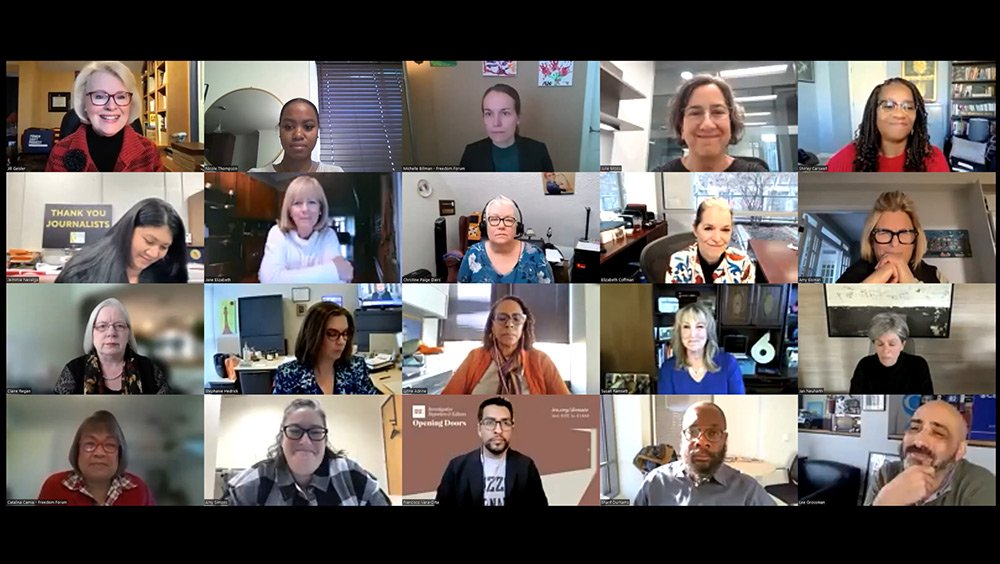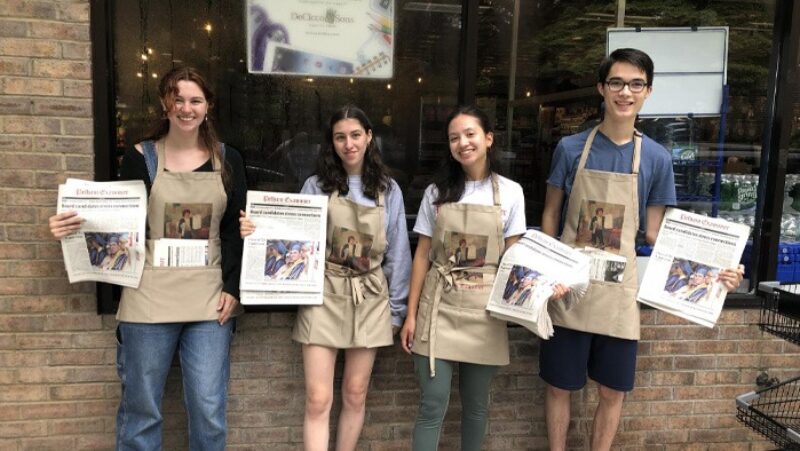Courageous Conversations Help Spark Changes in Newsroom Culture

Work remains to be done five years after #MeToo
Sue Ramsett remembers when she first began training her KWQC-TV colleagues and Gray Television regional managers with the goal of preventing sexual harassment, discrimination and incivility.
“I, personally, was surprised at the things I was hearing, like, ‘Wow, did they just say that out loud?’ Like, we don’t talk about this stuff,” said Ramsett, vice president and general manager of in Davenport, Iowa.
Ramsett spoke during a virtual roundtable of the Freedom Forum’s Power Shift Project trainers and advisory board members on Dec. 13, 2022, reflecting on the past five years since the #MeToo hashtag went viral.
“Now, I think the biggest change for me is that we talk about it,” said Ramsett, a Power Shift Project advisory board member. “We talk about it in our buildings, we talk about it in our social circles, and we’re talking about it as a company.”
Ramsett has been instrumental in offering this type of training to station staff, executives at parent company Gray Television and even her competitors. She is one of more than 470 journalists and educators who have received training from the Power Shift Project to teach the Workplace Integrity curriculum within their organizations.
The project emerged as the #MeToo movement forced the media industry to reckon with toxic, abusive newsroom cultures. Since then, nearly 250 media organizations and universities have partnered with the project, and nearly 2,500 journalists and educators have attended its webinars on allyship and inclusive leadership.
Claire Regan, president of the Society of Professional Journalists, says leaders have learned they need to support the agency of people who have come forward about being mistreated.
“With that, I’ve seen it already, comes solidarity. People do step up and support and listen, and that’s very rewarding,” said Regan. “It means that we’re making progress.”
Having these kinds of courageous conversations has moved the news industry forward, and, during the Freedom Forum’s hourlong discussion, several speakers reinforced the urgency of this work. Sharif Durhams, a Washington Post deputy managing editor and an at-large director for NLGJA: The Association of LGBTQ Journalists, stressed that newsrooms can’t grow complacent.
“I think the main thing that we learned is that there is still so much work in this space,” he said.
While the #MeToo movement has spurred varying degrees of change in different industries when addressing sexual harassment, many people from marginalized groups have told CNN, The Washington Post and other media outlets that they’ve been left behind.
In the news industry, Durhams sees a pernicious form of exclusion: microaggressions. He noted how newsroom leaders may assume they’re welcoming LGBTQ journalists, but if they’re having conversations that fail to consider these communities, then LGBTQ employees can feel that the newsroom is not an environment where they can thrive.
Another example of marginalization is when some newsrooms adopt policies that restrict how journalists can express themselves on social media. At KOMU-TV, which is owned and operated by the University of Missouri, student reporters are grappling with how to work as journalists while also remaining true to their identities and their desire to speak out on social justice issues. The station serves as an academic lab for the Missouri School of Journalism where news director Jeimmie Nevalga often facilitates these discussions.
“I tell the students, who will soon be entering the workforce, it is your generation that’s going to change how journalists interact with their personal lives and how they manage the news coverage as a journalist and just as a regular person,” she said.
Allowing employees to bring their full selves to work is key to attracting diverse talent, but we know recruitment isn’t enough. Retention is just as important, which means the work of improving newsroom culture is never done. In a prediction about journalism in 2023 for the Nieman Lab, media diversity expert Emma Carew Grovum noted a growing emphasis on creating new positions to support diverse hiring and long-term inclusion. She also said much more needs to be done, especially as media organizations grapple with staggering layoffs.
During the Power Shift conversation, Lynne Adrine, the former director of the D.C. Graduate Program for the Newhouse School at Syracuse University, recognized the challenges of creating systemic change and encouraged persistence. “Even if you are discouraged … you just keep at it, and remind people that there’s more to say about it for the people who say, ‘Do we have to do this again?’ Things have changed; things continue to change,” said Adrine, who also serves on the advisory board for Journal-isms Roundtable.
One trainer who keeps finding new ways to offer the Power Shift Project curriculum is Amy Simons, a professor at the Missouri School of Journalism. Simons hosts training sessions, monthly cohort meetings and half-day retreats to make it as convenient as possible for her colleagues to continue engaging with concepts of inclusion and equity since fostering a healthy workplace culture requires vigilance across the entire organization.
“This training is a lot like going for a mammogram. It is somewhat uncomfortable because these are not things we really want to be talking about, but we need to be, and we should be,” Simons explained. “Every time it’s offered, you should go because it’s good to keep it top of mind and to keep that awareness in place.”
Learn more about the Power Shift Project including upcoming Workplace Integrity: Train the Trainers workshops and the Inclusive Leadership and Do You Qualify as an Ally? webinars.
Michelle Billman is the former free press leadership & culture program manager at the Freedom Forum.
Election Night 2024 Through the Lens: Press Capture Historic Event
Meet Georgia, One of 42 Unique Professionals Stepping up for Their Hometown
Related Content
Religion. Speech. Press. Assembly. Petition.
Learn about the First Amendment.

